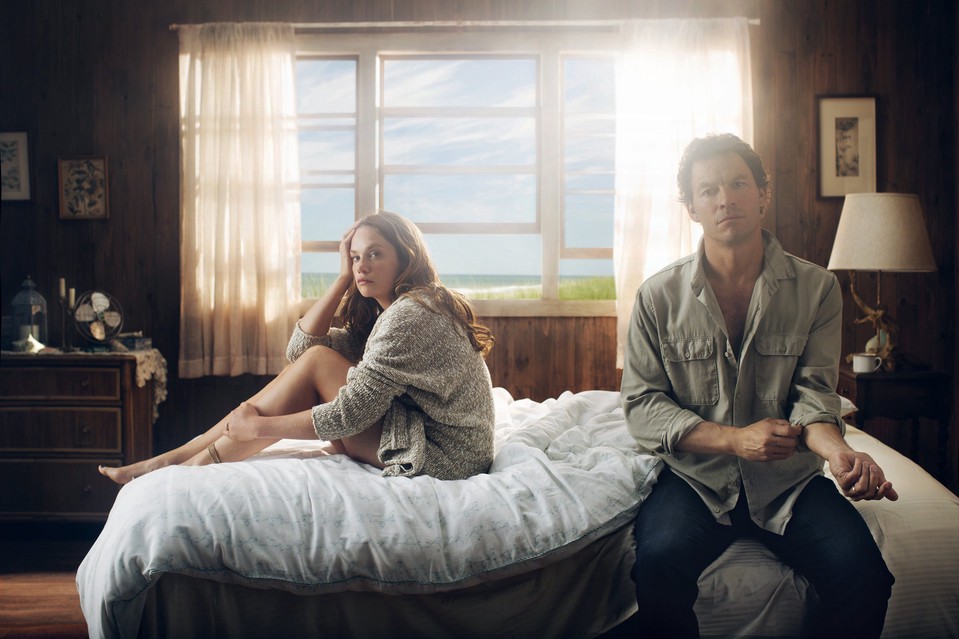Mild spoilers below for the first two episodes of The Affair.
Is Showtime’s The Affair more about her side than his?
Co-creator Sarah Treem (with In Treatment colleague Hagai Levi; like the show, this is a both-genders endeavor) has said she doesn’t want the drama to take a side — that its intention is to explore the nature of memory and dueling perspectives in a romantic relationship. Which, two episodes in, it’s doing in a pretty compelling way.
The show, which looks back at an affair in the Long Island town of Montauk between a vacationing author, Noah (Dominick West), and a local waitress, Alison (Ruth Wilson), is structured similarly to True Detective in that its leads are being mysteriously interrogated in the present(ish) day and flashing back to their memories of their first days together. (I found myself wondering whether Treem and Levi knew about True Detective, and were annoyed that it came out of the gate first.)
In interviews, Treem has focused strongly on the equal balance between the sides and expressed surprise that so many women seem to innately believe Alison more.
Still, I’d argue for two reasons that The Affair is weighted toward her, whether the creators want to admit it or not. First, a show about a romance that’s actually co-created and produced by a woman is still in the vast minority. Which means, when you think about it, that most of the depictions we’ve seen in pop culture of what goes down when a man and woman fall in love are inherently biased from the male perspective. The simple act of pulling the rug out from under Noah’s story — including, maybe especially, in its little details — is an inherently subversive act.
Second, and perhaps more obviously: Noah just seems creepier. Doesn’t he? This is not to say the tables won’t be turned, that Alison won’t turn out to be the killer of… whomever is obviously dead. But by virtue of making his version the first half of the show and Alison’s second, The Affair almost begs us to believe Alison’s has more truth to it.
Because in a lot of ways, what Noah’s describing to us is the noir seduction we’ve seen countless times in books, movies, and other shows. He’s at least semi-happily married, on vacation with his wife and kids, when he crosses paths with a femme fatale in a tight yellow waitress uniform. (“What do you remember about her?” the interrogator asks him in voiceover. “Her face,” he says, as the camera lingers on her ass.)
They meet again on the beach and she cajoles him back to her place, inviting him into the outdoor shower and eventually locking eyes with him while having sex on the car with her husband (Joshua Jackson). “Maybe you should try living a little,” she purrs at him in the second episode. “Then you’d have something to write about.”
It all looks and sounds so familiar. Only it’s not the truth — at least, not the whole truth. She wasn’t wearing a tiny dress that time on the beach; she was wearing shorts. He invited himself back to her house and asked leading questions about the damn shower. He freaked her out when she realized he was standing in the bushes watching her and her husband in that sex scene. And we never hear her utter that campy line in the “Alison” portion of the second episode.
Basically, it’s not as simple as it looked at the outset. And that’s the point Treem is trying to make. You need women’s voices in the mix when telling stories about men and women.
“If you want to tell complicated, true stories about women, then you need women in charge of storytelling. It’s hard for any of us to really get into the heads of other people and understand what makes them tick. I’m not saying that’s impossible at all: I think there are plenty of men in television who write really complicated and really truthful women. But I think having more female voices in charge of these shows can only augment what they already have. And I think the networks are realizing that now.”
The best thing The Affair has done for me — other than astound me with how foxy Pacey Witter (Joshua Jackson) has become — is make me think back to all those many, many other stories of torrid relationships and imagine how delightful it’d be to see them halved and told from both sides, rather than simply from his (because more often than not, by a rather large margin, that’s who’s doing the telling.) Slate delved into this train of thought with an essay on “the psycho bitch,” the trope most recently seen in David Fincher’s Gone Girl.
The Affair initially sets us up to believe Alison might fall into this category as well (“Welcome to the end of the world,” she greets Noah upon their first meeting at the lobster-roll shack), but turns the tables by shutting him up half an hour in. The show also made me think back to The Honourable Woman and Maggie Gyllenhaal’s voiceover in the credits: “Who do you trust?”
Between it, and Gone Girl, and True Detective, and now The Affair, we’re definitely living in a pop-cultural era where the reliable narrative has gone out the window. And given how tediously often that narrative has been male, this can only be a good thing.






